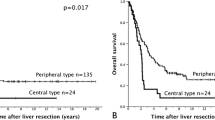Abstract
Over a 10-year period, 166 patients underwent liver resection with curative intent for colorectal secondaries. These included 23 (13.8 %) with metastases invading to adjacent organs. Diaphragm (n = 9), major omenturn (n = 5), portal vein/inferior vena cava (n = 3), gallbladder/extrahepatic biliary system (n = 3), right adrenal gland (n = 2), and lymph nodes of the hepatoduodenal ligament (n = 1) were resected en bloc together with the metastases. Operative mortality was 4.3% (1/23 patients). Intraoperative findings and the pathologist's report led to the performance of R0 resection in 14 patients, and microscopic residual disease after R1 resection was found in 7 patients; in 2 cases macroscopically visible tumour had to be left behind. Median survival for all patients was 14 months and was significantly less favourable than in patients who had undergone resection of metastases confined to the liver (P = 0.011, long-rank test). The median recurrence-free interval was 6.8 months (P = 0.11). Obviously, patients who had undergone R0 resection and whose CEA serum levels returned to normal after operation benefited the most, and among these a median survival of 17 months was recorded. It is concluded that in patients with liver metastases from colorectal cancer, invasion of the metastases to adjacent organs has significant implications for the prognosis, even if the metastases are resected. It is important to detect this situation preoperatively, to avoid subjecting patients to a treatment that offers little benefit.
Zusammenfassung
In einem Zehnjahreszeitraum wurde bei 166 Patienten eine Leberresektion wegen Metastasen kolorektaler Karzinome mit kurativer Zielsetzung vorgenommen. Bei 23 Patienten (13,8%) lag eine die Organgrenze der Leber überschreitende Metastasierung vor. Infiltrationen ins Diaphragma (n = 9), Omentum majus (n = 5), Pfortader/V. cava inferior (n = 3), Gallenblase/extrahepatische Gallenwege (n = 3), Nebenniere (n = 2) und Lymphknoten des Ligamentum hepatoduodenale (per continuitatem n = 1) wurden reseziert. Die Operationsletalität betrug 1/23 (4,3 %). Intraoperativ und nach histopathologischem Befund wurde bei 14 Patienten eine R0-Resektion, bei 7 Patienten eine R1-Resektion und bei 2 Patienten eine R2-Resektion erreicht. Die mediane Überlebenszeit betrug 14 Monate und war signifikant ungünstiger (p = 0.011, Log-rank-Test) im Vergleich zu Patienten nach Resektion auf die Leber beschränkter Metastasen. Die mediane rezidivfreie Überlebenszeit betrug 6,8 Monate vs. 10,5 Monate (p = 0,11). Bei Patienten mit die Organgrenze der Leber überschreitender Metastasierung eines kolorektalen Karzinoms muß auch nach erweiterter Resektion von einem signifikant ungünstigeren Verlauf ausgegangen werden. Es gilt, these Situation präoperativ durch extensive Diagnostik zu erkennen, um nicht Patienten einer operativen Behandlung zuzuführen, von der she nur eingeschränkt profitieren.
Similar content being viewed by others
Literatur
August DA, Sugarbaker PH, Schneider PD (1985) Lymphatic dissemination of hepatic metastases. Cancer 55:1490–1494
Chu DZ, Erickson CA, Russell MP, Thompson C, Lang NP, Broadwater RJ, Westbrook K (1991) Prognostic significance of carcinoembryonic antigen in colorectal carcinoma. Serum levels before and after resection and before recurrence. Arch Surg 126:314–316
Fortner JG, Silva JS, Golbey RB, Cox EB, Maclean BJ (1984) Multivariate analysis of a personal series of 247 consecutive patients with liver metastasis from colorectal cancer. I. Treatment by hepatic resection. Ann Surg 199:306–316
Glazer GM, Aisen AM, Francis LR (1986) Evaluation of focal hepatic masses: a comparative study of MRI and CT. Gastrointest Radiol 11:263–268
Görg C (1989) Echografische Erscheinungsformen von Lebermetastasen. Tumor Diagn Ther 10:212–217
Hohenberger P, Schlag P, Schwarz V, Herfarth C (1988) Leberresektion bei Patienten mit Metastasen colorectaler Carcinome — Ergebnisse und prognostische Faktoren. Chirurg 59/6:410–417
Hohenberger P, Schlag P, Schwarz V, Herfarth C (1989) Tumour recurrence following liver resection for colorectal metastases — Implications and results of further treatment. J Surg Oncol 44:245–251
Hohenberger P, Herfarth C (1992) Reoperation beim colorectalen Karzinom mit kurativem Ziel. Schweiz Med Wochenschr 122:1079–1086
Lightdale CJ (1982) Laparoscopy and biopsy in malignant liver disease. Cancer 50:2672–2675
Mittal R, Kowal C, Starzl T, Van Thiel D, Bran K, Iwatsuki S, Schade R, Straub W, Dekker A (1984) Accuracy of computerized tomography in determining hepatic tumor size in patients receiving liver transplantation or resection. J Clin Oncol 2:637–640
Müller JM, Schmidt A, Strauss JM, Zieren HU (1991) Resektion von Lebermetastasen kolorektaler Karzinome. Anspruch und Wirklichkeit. Dtsch Med Wochenschr 116:681–688
Purkiss SF, Williams NS (1992) Accurate method to measure the percentage hepatic replacement by tumour and its use in prognosis of patients with advanced colorectal cancer. Br J Surg 79:136–138
Ringe B, Bechstein WO, Raab R, Meyer HJ, Pichlmayr R (1990) Leberresektion bei 157 Patienten mit colorectalen Metastasen. Chirurg 61:272–279
Scheele J, Stangl R, Altendorf-Hoffmann A (1991) Indicators of prognosis after hepatic resection for colorectal secondaries. Surgery 110:13–29
Scheele J, Stangl R, Altendorf-Hoffmann A (1990) Hepatic metastases from colorectal carcinoma: impact of surgical resection on the natural history. Br J Surg 77:1241–1246
Silvestrini R, Costa A, Gennari L, Doci R, Bombardieri E, Bombelli L (1990) Cell kinetics of hepatic metastases as a prognostic marker. HPB-Surg 2:135–143
Stephenson KR, Steinberg SM, Hughes KS (1988) Perioperative blood transfusions are associated with decreased time to recurrence and decreased survival after resection of colorectal liver metastases. Ann Surg 208:679–687
Ward BA, Miller DL, Frank JA, Dwyer A, Simmons JT, Chang R, Shawker TH, Choyke P, Chang AE (1989) Prospective evaluation of hepatic imaging studies in the detection of colorectal metastases: correlation with surgical findings. Surgery 105:180–187
Younes RN, Rogatko A, Brennan MF (1991) The influence of intraoperative hypotension and perioperative blood transfusion on disease-free survival in patients with complete resection of colorectal liver metastases. Ann Surg 214:107–113
Author information
Authors and Affiliations
Additional information
Teile dieser Arbeit wurden auf der 109. Tagung der Deutschen Gesellschaft für Chirurgie in München vom 21. bis 25.04. 1992 vorgestellt und in Abstractform im Kongreßband veröffentlicht
Rights and permissions
About this article
Cite this article
Hohenberger, P., Schlag, P. & Herfarth, C. Erweiterte resektion von lebermetastasen beim kolorektalen Karzinom. Langenbecks Arch Chir 378, 110–114 (1993). https://doi.org/10.1007/BF00202119
Received:
Issue Date:
DOI: https://doi.org/10.1007/BF00202119




